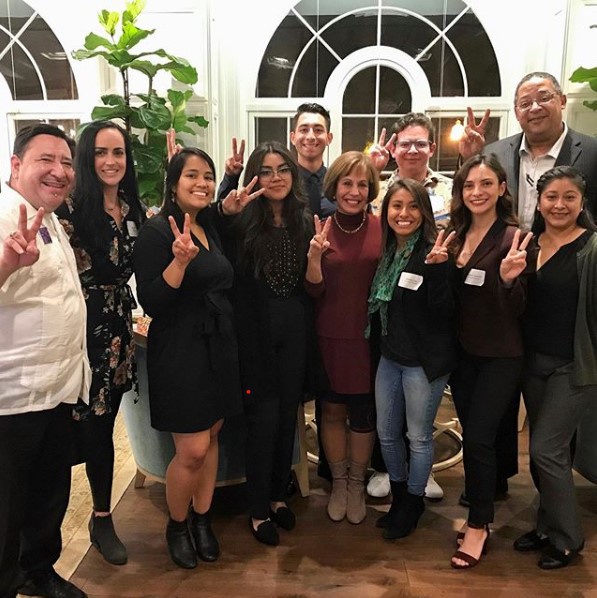IDEAS at USC proposes new resources for undocumented students

(Photo courtesy of IDEAS)
Improving Dreams, Education, Access, and Success, a campus organization that seeks to create a safe space for undocumented students and facilitate dialogue, met with President Carol Folt and Vice President for Student Affairs Winston Crisp to discuss new resources to support the undocumented community on campus.
The meeting took place after IDEAS Executive Director Valeria Resendiz met Folt in an elevator and started talking about the organization. The group then came up with a proposal for changes to share with Folt and Crisp.
Kimberly Alvarado, a senior majoring in social sciences, said the group had previously tried to set up a meeting with former President C.L. Max Nikias but did not receive any response from the administration. However, Alvarado said the organization saw Folt’s appointment as an opportunity to make their voices heard.
“It is the new administration, and I think that they’re still figuring out a few things,” Alvarado said. “What I took from the meeting is that they are going to work with us for the undocumented community.”
At the meeting, students discussed the need for a centralized resource center for undocumented students and training for academic counselors and mental health professionals to better understand the undocumented community. IDEAS also advocated for financial aid training since a few students had been misidentified as international students and received inaccurate aid.
Resendiz, a senior double majoring in political science and NGOs and social change, said that the meeting was a way to get the administration and community to share experiences and begin talking about ways to improve resources for the students.
“The focus for the meeting was really to build that relationship, to bridge the gap between the administrators and the students who live the experiences,” Resendiz said. “At the same time, we received a lot of empathetic feedback and support from them.”
While no timeline is in place to implement the changes, Alvarado said she felt that IDEAS members were given enough space and time to talk and felt they were being heard. However, she said they expected action and would follow up if necessary.
“We received as much time as needed,” Alvarado said. “I felt that both the president and the vice president were interested in what we were saying.”
Resendiz said that the group would continue to provide support to the undocumented community and hold the administration responsible for the changes that were discussed in the meeting.
“So now our next move is just to use our community and our allies to make sure that they follow through with supporting this community because previous administrations have not,” Resendiz said.
Crisp said that he and Folt believe that all students who come on campus regardless of their status deserve an equal academic opportunity to achieve their goals but undocumented students often lack access to financial aid, scholarships and other resources.
“I think when you’re an undocumented student there are barriers,” Crisp said. “[There are] obstacles that you have to overcome in order to access education in the same way as students who are not undocumented that have everything to do with immigration classification.”
Currently, the University offers resources such as the Pop-Up Dream Center in the Student Union, an immigration clinic that provides legal assistance and DACA fee renewal support for students. The clinic is currently looking at ways it can train faculty on undocumented student issues and form a physical space where students can access all the resources available to them.
“The University has tremendous space needs all over,” Crisp said. “We’re providing support and community for a lot of our populations, particularly a lot of our underrepresented populations that have all kinds of cultural or other needs … and we need space to figure out how to help to do that.”
Crisp said that the meeting helped him understand the perspective of undocumented students and learn about the challenges they faced in their daily lives. He said he was amazed at the honesty and openness of the students who shared their experiences.
“It was very inspiring to hear the students talk about all that they’ve overcome and all that they need to overcome to seek out the same dreams as everybody else on this campus and in this country,” Crisp said. “It was a very powerful meeting that we greatly appreciated.”
Crisp said the meeting got him thinking of ways the administration could continue to support IDEAS and other groups by working with them to find space and centralizing access to resources.
“[We] certainly came out of it committed to continuing work with this group and with others to try to figure out how we can find better space to create community and opportunities for more programming — how we can do more with what we already have and consolidate things so that our students do have access to the resources that they need,” Crisp said.
Correction: A previous version of this article incorrectly stated that IDEAS stands for Improving Dreams, Equality, Access, and Success. The acronym stands for Improving Dreams, Education, Access, and Success. The Daily Trojan regrets this error.

